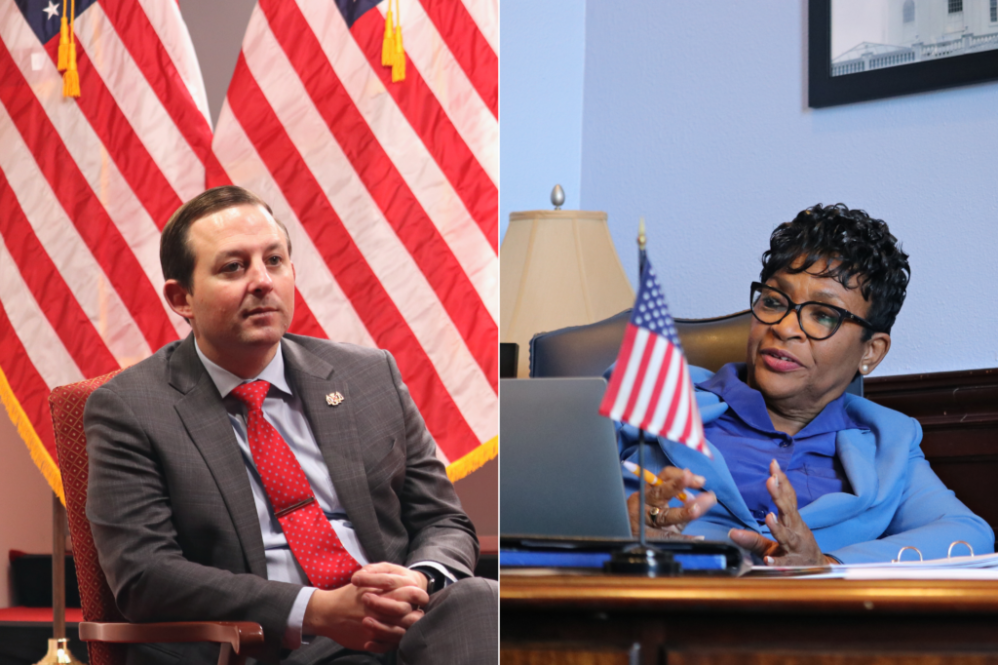Maryland Matters:
In many state capitals, four years as a presiding officer of a legislative chamber is a pretty robust tenure.
In the Maryland State House, it’s a nanosecond.
House Speaker Adrienne Jones (D-Baltimore County) and Senate President Bill Ferguson (D-Baltimore City) are entering their fourth sessions as the leaders in their respective chambers. Both replaced legendary and record-setting presiding officers: The late House Speaker Michael Busch (D) had the job for 17 years, and the late Senate President Mike Miller (D) held the gavel for 33 years.
But even if Jones’ and Ferguson’s tenures seem puny in comparison, the 2023 General Assembly session marks a significant milestone for each: This is the first year of the legislative term, meaning it’s the first legislative term when the presiding officers will be fully in control of the legislature, rather than filling the remainder of their predecessors’ terms. They’ve now got their own leadership teams completely in place, and Ferguson just reshuffled the portfolios of two Senate committees.
“It does feel like a fresh start,” Ferguson said in a recent interview.
What’s more, after dealing with Gov. Larry Hogan (R), who was elected in 2014, Ferguson and Jones now have more leadership experience at the upper echelons of government than the man who will soon be moving into Government House, Gov.-elect Wes Moore (D), and that will impact the political and policymaking dynamic during the 90-day session and beyond. So will the fact that the presiding officers and new governor share the same political party and, to a great extent, a common agenda.
“We’re the ones who have the history,” Ferguson said. “We look forward to helping set the agenda and the policy framework for the new administration.”
Jones and Ferguson endorsed Moore fairly early in the Democratic primary for governor, and both are invested in his success.
In an interview Monday, Jones expressed optimism that the communication between the legislature and the governor’s office will be better under Moore than it was with Hogan. Jones recalled that former Democratic governors Parris Glendening and Martin O’Malley invited committee chairs and the presiding officers from both chambers to the governor’s mansion to discuss the state budget and other legislative business.
“As a bonus, we got breakfast,” she said.
Jones said Hogan organized a similar meeting one time during his two terms and it never happened again.
In addition, Jones anticipates fewer bills being vetoed after Moore and Lt. Gov.-elect Aruna Miller (D) are sworn in on Jan. 18.
Moore, who takes office a full week after the House and Senate gavel in, has suggested he’ll pursue bold policy goals over the next four years. But he has yet to move beyond the rhetoric of the campaign and offer a specific legislative agenda — something he is in the process of developing with his team. Moore’s chief legislative liaison will be Eric Luedtke, who until recently was House majority leader under Jones.
Moore’s legislative agenda will include the unveiling of the proposed state budget on Jan. 20. Thanks to a new set of rules, legislators will have more say over the budget than they have in the past. That was a move the legislature made in reaction to Hogan, but it’s Moore and his fiscal advisers who will have to grapple with the consequences.
And legislative leaders aren’t waiting for Moore to unveil his agenda. They’ve outlined policy priorities of their own — both for this session and for the full four-year term — and their members are eager to get to work.
“There’s so much transition happening,” Ferguson said. “And we’re fortunate to have resources to be able to think really boldly and creatively about where Maryland can go over the next decade. Year one of this term is setting up the four years of this term. We’re not going to solve every problem this year. This year is setting the table for a really important four years ahead, with new leadership, new vision, new representation.”
Ferguson said his top priorities for the session include:
- Workforce development — which is also a priority of Moore’s. The legislature set aside $25 million last year for apprenticeship and other job creation programs. The goal this year, Ferguson said, is to “figure out how to set up this structure well.”
- Standing up a recreational cannabis industry and providing restorative justice for communities of color that have been most adversely impacted by the war on drugs. Ferguson said he’d like to see licensing and tax and revenue proposals resolved by session’s end, along with the justice piece.
- Mental health. Ferguson wants the state to make investments to ensure adequate treatment and facilities for those seeking mental health services, especially young people.
- Abortion rights. The Senate was the graveyard for a proposal to enshrine abortion rights into the state constitution in 2022, but Ferguson said he expects the measure to pass. And he said he expects the legislature to consider legislation that would shield abortion providers from prosecution for providing the procedure to women from states where abortion is now illegal.
- Transportation revenues. With mandates to expand the use of electric vehicles in the years ahead, Maryland may have to move away from the long-held model of using the gasoline tax to fund transportation projects. Ferguson believes this is the year to begin a conversation of what to pay for and how. “In the next five to 10 years, I suspect there’s going to be a massive change, so this is the year to start thinking about, what is our transportation program going to look like — both how do we fund it and what are we investing in?” Ferguson said.
Some of Jones’s priorities align with Ferguson’s, including investing in mental health services, making sure Maryland remains “a safe haven” for those seeking an abortion and ensuring there’s an equity component within a legalized recreational cannabis industry.
Members of the Senate and House plan to assess and establish policies on recreational cannabis, especially for Blacks and Latinos most affected by the war on drugs, to receive equal opportunity to participate in the industry.
“One of the things we want to make sure is there is equity when this rolls out,” said Del. Nicole Williams (D-Prince George’s), who serves on the House Cannabis Referendum and Legalization work group.
Jones said another priority is implementing paid family and medical leave. Lawmakers approved legislation for it last year but isn’t scheduled to go into effect until 2025.
Ferguson argued that lawmakers passed so many major pieces of legislation in recent years, like the Blueprint for Maryland’s Future education reform plan and the Climate Solutions Now environmental initiatives that one of their imperatives for the upcoming session is ensuring that these measures are being implemented properly. That’s one of the areas where the legislature expects to work closely with the Moore administration, he said.
But to ensure that these programs are successful, Moore is going to have to restock state government, which Hogan has allowed to hollow out, both presiding officers said. There are an estimated 6,800 open jobs in state agencies. Jones called the vacancy rates “horrendous.”
“I think it’s one of the highest vacancy rates the state has ever seen,” she said. “We anticipate having a healthy budget surplus that will give us enough funding to actually have new programs and new employees.”
Ferguson appeared to be lukewarm to one proposal that Moore and some lawmakers are promoting: Accelerating the timetable for raising Maryland’s minimum wage to $15 an hour. The hourly wage goes up annually, but it isn’t scheduled to hit $15 until 2025 for larger businesses and 2026 for small employers.
“There may be room to do something, but I have to say, we have to have a lot more conversations,” he said. “This is an issue that we tackled a few years ago. It’s a priority for the administration so we will entertain the conversations and see what makes the most sense.”
Asked whether she’d support the push to accelerate the minimum wage timetable, Jones replied, “I think this will be doable.”
Jones said she’s excited to be working not just with Moore, but with the historically diverse complement of newly-elected statewide officials: Miller, who was born in India and is the first woman of color elected lieutenant governor; Attorney General Anthony Brown (D), the first Black AG in state history; and Comptroller-elect Brooke Lierman (D), the first woman to be independently elected to a statewide office in state government, who will be sworn in Monday.
“Those three cut their teeth in the General Assembly, so I know they’re great,” Jones said.
Other Democratic lawmakers are also looking forward to serving with the incoming slate of state officials.
“I’m more excited today than I have ever been in office,” Sen. William Smith Jr. (D-Montgomery), who chairs the Judicial Proceedings Committee, said in an interview. “This is the first time I’ll be able to partner with a Democratic governor and a new energy in the attorney general’s office. I’ve partnered with Brian Frosh and I’m looking forward and continuing that good relationship [with Anthony Brown]. New energy in the comptroller’s office. Not only do we have a historic team, [but] a team that I think is going to work well across all branches of government. It’s a really exciting time in Maryland.”
Photo: Senate President Bill Ferguson (D-Baltimore City) and House Speaker Adrienne A. Jones (D-Baltimore County) discuss their top priorities for the 2023 General Assembly session. Photos by Danielle E. Gaines.












